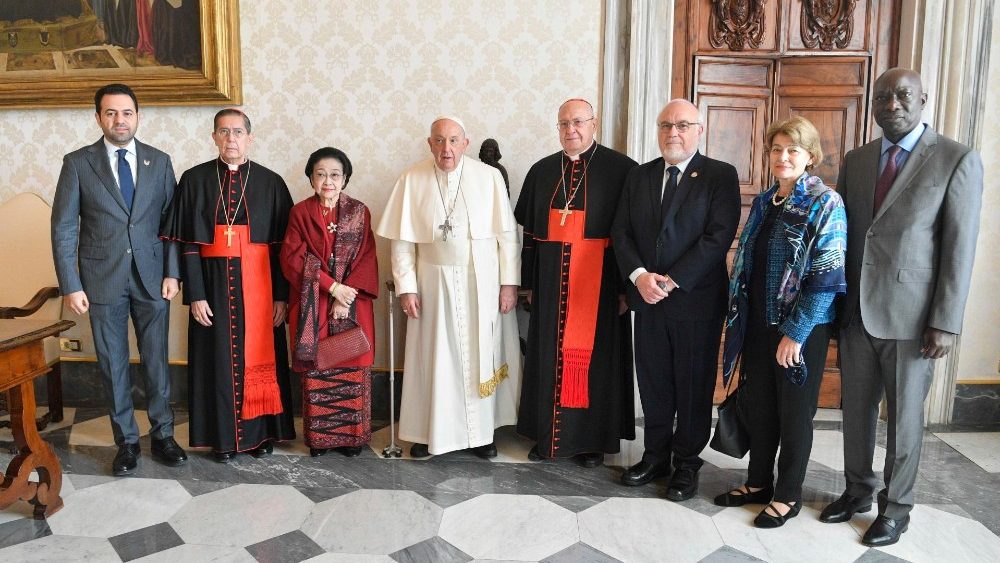Judges for Zayed Award seeking concrete examples of fraternity
By Alessandro Di Bussolo
The Document on Human Fraternity, signed almost five years ago in Abu Dhabi by Pope Francis and the Grand Imam of Al-Azhar Ahmed Al-Tayeb, and the subsequent Zayed Prize, created “a new state of mind and a global movement, on dialogue, fraternity, and cooperation between different religions and cultures.”
Now, says Judge Mohamed Abdelsalam, “the Prize wants to become more solid and well-known, but already from the 40 nominations submitted in 2019 we have grown to over a hundred.” This is how Egyptian judge Mohammed Abdelsalam, secretary general of the Zayed Prize for Human Fraternity, the first Arab and first Muslim to be awarded the papal knighthood and to present a papal encyclical, the Fratelli tutti, recalled the impact that the historic document, and the prize that followed, have on today's world.
He did so at a round table organized by Vatican News/Vatican Radio and moderated by Sister Bernadette Reis. Taking part in the event were the members of the judging committee for the 2024 edition of the Prize, who earlier in the day had been received in audience by Pope Francis. The Committee met in the Vatican to evaluate the nominations for the award, which will be presented on 4 February 2024, on the fifth anniversary of the signing of the Document, coinciding with the International Day of Human Fraternity established in December 2020 by the United Nations.
Former president of Indonesia and former Bulgarian minister on the jury
The judging committee is an independent committee made up of experts in the field of peacebuilding and coexistence, including Megawati Sukárnoputrì, former president of Indonesia (from 2001 to 2004) and the first woman to hold the position, as well as the first woman to lead a modern Muslim state. In 2004, she was ranked number eight on Forbes magazine’s list of the 100 most powerful women in the world. Sukárnoputrì spoke with the Pope about the issue of global warming and the importance of access to better education for the younger generation, especially women, who must have equal opportunities with their male peers.
Alongside her was Irina Bokova, former foreign minister of Bulgaria and the first woman and first European from the south-east to hold the position of director general of Unesco for two terms. Since 2020, she has been a member of the Higher Committee to implement the Abu Dhabi Document and promote its concrete application. She said the Document on Human Fraternity “should be seen as a fundamental ethical document of our time,” in which young people can find answers and which is in harmony with the fourth point of the United Nations Sustainable Development Goals on education. She described Pope Francis as a “great humanist,” and – returning to the topic of education – recalled that in 2015, in her first audience with the pontiff, Pope Francis had described education as dealing with “the grammar of dialogue” whose foundations are curiosity about the other, listening, respect, and sharing.
Rabbi Cooper: the Pope, an impatient man
Rabbi Abraham Cooper, president of the US Commission on International Religious Freedom, which monitors violations of religious freedom in 28 countries around the world, spoke next. Cooper is also associate dean and director of global social action at the Simon Wiesenthal Centre, a leading Jewish human rights organization. He called the Pope “an impatient man,” with a great desire for peace, who encourages people and peoples to do good. The US rabbi insisted that we must teach younger generations “that life is about making choices and taking responsibility.”
Judge Abdelsalam, prompted by the moderator, also addressed the issue of climate change, calling it “a challenge for humanity,” which is why the Muslim Council of Elders organized a meeting of religious leaders before the Cop28 in Dubai. Climate change, he said, is a challenge "for the principles of coexistence and life in peace and harmony, because climate change threatens the lives of people.” He quoted Grand Imam Al-Tayyeb when he recalled that “if this exploitation continues, we will have no environment for future generations.”
Sandri: an invitation from Francis to continue dialogue
Finally, Cardinal Leonardo Sandri, Prefect Emeritus of the Dicastery for the Oriental Churches, who has also served as a diplomat in Madagascar, in the United States as papal representative to the Organisation of American States, in Venezuela, and in Mexico, emphasized that in Abu Dhabi, where he was present, a prophetic document was signed, 'which opened a new path of understanding and dialogue'.
The final member of the judging committee, Rebeca Grynspan Mayufis, Secretary General of UNCTAD, the United Nations Conference on Trade and Development, was unable to attend.
Thank you for reading our article. You can keep up-to-date by subscribing to our daily newsletter. Just click here













